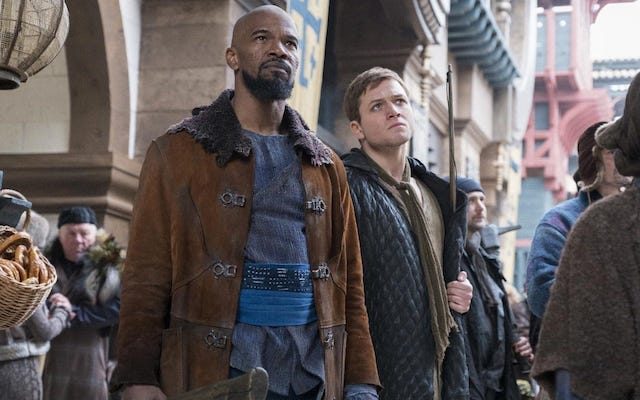
The latest familiar story to be revised by a narrator who implores us to “forget what [we] think we know” about it is the tale of Robin Hood, captured in “Robin Hood” (not to be confused with the 11+ other films called “Robin Hood,” or the 70+ other films that are about Robin Hood without being titled “Robin Hood”). Directed by one Otto Bathurst, who comes to us from British TV, and written by first-timers Ben Chandler and David James Kelly, this is a dumbly anachronistic action-adventure that you will never believe was not directed by Guy Ritchie and written by 12-year-olds.
Our prince of thieves, played by Taron Egerton (“Kingsman: The Secret Service”), begins as a nobleman who’s sent off to the Crusades in the late 1100s, summoned by a sealed letter from the government that says “DRAFT NOTICE” at the top, as such notices always did in the 12th century. When Robin returns, four years later, his beloved Marian (Eve Hewson), believing him dead, has married Will Scarlet (Jamie Dornan), a dull Irish tool. What’s more, the sniveling, fear- and warmongering Sheriff of Nottingham (Ben Mendelsohn), has begun to tax the peasants egregiously to pay for the Crusade, which he says is necessary because the Arabians “hate us — our freedom, our culture, our religion.” Later we learn that the Sheriff is colluding with the Arabians to prolong the war to line his own pocket. He doesn’t say, “No collusion! No collusion! You’re the collusion!,” but it’s implied.
(Does the movie do anything with these parallels to modern times? No, it is too dumb.)
It’s not Robin who has the idea to rob from the rich and give to the poor, though. That comes from John (Jamie Foxx), a Muslim whom Robin met and sort of defended during the Crusades, who has followed Rob back to England to bring down the corrupt English government from the inside. His idea is to stop the war by defunding it (ha ha, imagine not doing a war just because you couldn’t pay for it), prompting Robin to become Batman: respectable lord by day, masked wealth-redistributionist and folk hero by night.
Is there a Friar Tuck? Sure. He’s played by Tim Minchin, and he’s supposed to be the comic relief. He is not funny.
Is Robin an expert archer? Yes, after a training montage under the tutelage of John, who went to the trouble of painting human figures on thin planks of wood for targets, like modern-day shootings ranges have. Maybe I’m stuck on the best version of Robin Hood — the one with the singing cartoon animals — but has Robin always been such a cold-blooded killer? He shoots many arrows into many torsos here, including the torsos of low-level guards and stooges, whom action heroes usually dispatch non-lethally with a conk to the noggin. Had the silent one-punch knockout not been invented yet?
What about the device that rapid-fires arrows like a machine gun? Had that been invented yet? Because they do have one of those.
Mendelsohn is deliciously hammy as the Sheriff, and he and Sir Robin wear very handsome jackets. But the movie is too moronic to be taken seriously, not flagrantly stupid enough to be an entertaining hate-watch. Instead it falls in the middle ground where forgettable movies go to die.
P.S. Speaking of rich people having their money taken from them, Lionsgate spent $100 million on this.
C (1 hr., 56 min.; )





